 Petzlover
PetzloverGran Mastin de Borinquen is originated from United States but Slovak Cuvac is originated from Slovakia. Both Gran Mastin de Borinquen and Slovak Cuvac are having almost same height. Gran Mastin de Borinquen may weigh 24 kg / 53 pounds more than Slovak Cuvac. Both Gran Mastin de Borinquen and Slovak Cuvac has almost same life span. Gran Mastin de Borinquen may have more litter size than Slovak Cuvac. Gran Mastin de Borinquen requires Low Maintenance. But Slovak Cuvac requires Moderate Maintenance
The Gran Mastín de Borinquen is also referred to as the Puerto Rican Mastiff or the Mastín Borincano and is actually native to Puerto Rico.
The dog seems to have originated long ago already during the 16th century. Its a dog that descends from a number of dogs, and the dog from these crosses became a huge, ferocious dog.
For centuries the Gran Mastin de Borinquen was used to protect the estates of the Spanish nobility. Today the breed is considered rare and it isn't recognized by any major kennel club as a standardized breed.
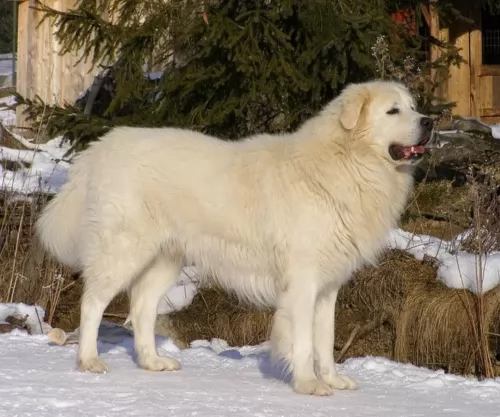 Looking quite a bit like the Pyrenean Mountain Dog, the Slovak Cuvac is a large dog that has served as a guard dog. The Slovensky Cuvac is still used on sheep farms as he isn’t afraid of wolves and bears and will take them on if needs be.
Looking quite a bit like the Pyrenean Mountain Dog, the Slovak Cuvac is a large dog that has served as a guard dog. The Slovensky Cuvac is still used on sheep farms as he isn’t afraid of wolves and bears and will take them on if needs be.
Records of this dog have been kept since the 17th century already, and when the breed started dying out, a certain Dr Antonin Hruza put in efforts to revive the dog.
The registered breeding of the Slovensky Cuvac was established in Czechoslovakia and a club for the dog was established in 1933. A written standard was established in 1964. The dog is not recognized by the Fédération Cynologique Internationale.
The Gran Mastin de Borinquen is a large dog. He stands roughly between 56 and 71cm and weighs in at between 41 and 68kg.
He is well muscled with a large head and short floppy ears but until recently the ears have always been cropped. The nose is black, the eyes dark brown and small and he has an alert, intelligent look to him.
These days the tail is kept long and it is held low. The coat is short in length and harsh with the colour being fawn, black, cream or brindle. You'll also find some small inclusions of white on the coat.
Loyal and protective, the Gran Mastin de Borinquen forms a strong bond with his master, becoming aggressive with any stranger who comes too close to his owner.Its a dog that has been taught to be aggressive so he isn't the best pet to choose if you have children in the home. He isn't the best dog either for first time dog owners, particularly if the person isn't a strong, firm person around him, showing who is boss.
However there are people who have had their pet trained and socialized and who claim he makes a wonderful family pet. The way a dog is brought up can play a large role in the way he turns out.
Train and socialize your Gran Mastin de Borinquen because he is inclined to be strong-willed and for a large, aggressive type of dog, you want him to be obeying you.
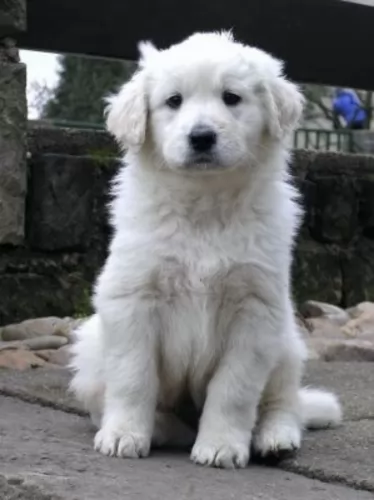 This is a large dog standing at between 59 and 70cm in height and weighing between 31 and 44kg.
This is a large dog standing at between 59 and 70cm in height and weighing between 31 and 44kg.
The neck is broad and has quite a bit of fur around it. The head is large, the eyes dark brown, the double coat is white and thick and medium length. The eyes are brown, the ears medium length and floppy and the tail long and furry.
This is a robust dog, used to spending time outdoors keeping watch over livestock. When he is invited into the home, he is gentle and well behaved, more so when he has been trained and socialized.
He is loving and loyal towards his human family and will get on well with children in the home. He isn’t the brightest dog but you can still have him trained.
Noble, courageous and loyal, a trained, socialized Gran Mastin de Borinquen who has learned simple commands such as sit, down, come, stay, lie-down and heel will be an absolute pleasure to have around and be a well behaved, obedient companion for you.
Your Gran Masin is a dignified, loving animal, but because of his size and his origin, bred to be aggressive, he isn’t looked upon as the first choice when you’ve got small children in the home. With the right owner – fair, firm and loving - he makes a splendid pet.
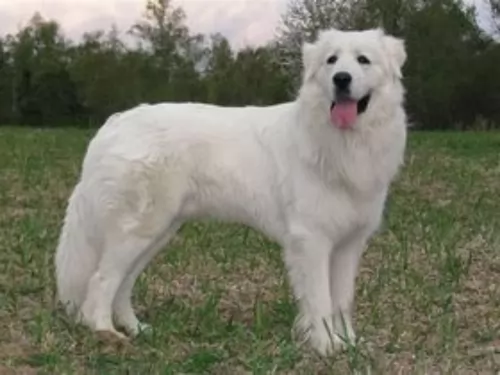 Your playful Slovak Cuvac is an affectionate dog, wanting nothing more than to be totally involved in his family’s life.
Your playful Slovak Cuvac is an affectionate dog, wanting nothing more than to be totally involved in his family’s life.
He is social and loving and also makes an excellent watchdog. He’s a big dog so think carefully before you bring him into your home. Many dog owners like the look of a big dog and forget that it costs a lot of money to feed a big dog and to pay for vet fees.
This big dog is wanting to be part of your family and not just to be discarded when you find that he is costing you too much.
Your Gran Mastin de Borinquen can get to 12 years of age with good care. Mastiff-type dogs like this can be prone to eye problems as well as having to tackle joint problems such as hip dysplasia.
Other issues that can appear in this breed, but are unlikely be cancer, bloat, hypothyroidism and von Willebrand’s Disease which is a bleeding disorder.
Remember to do daily inspections of your Gran Mastin de Borinquen for fleas and ticks, particularly during the Summer month. Toxins introduced into the body by a tick bite for instance can make your pet seriously ill so that veterinary intervention is required.
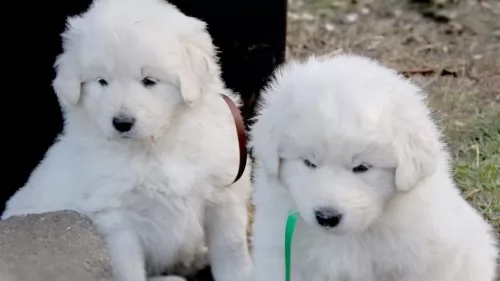 This is a healthy dog breed, but as with many large dogs, hip dysplasia is a threat. Hip dysplasia is always reason for concern as the condition can reduce a dog’s quality of life.
This is a healthy dog breed, but as with many large dogs, hip dysplasia is a threat. Hip dysplasia is always reason for concern as the condition can reduce a dog’s quality of life.
It is distressing seeing your once active pet becoming reluctant to play and move around.
Canine hip dysplasia is a common skeletal condition. It can strike any size dog but is more prevalent with large dogs. The ball and socket of the hip doesn’t fit properly and deterioration sets in resulting in loss of function of the joint.
You will need to get your dog to the vet who will perform a physical exam and discuss treatments to alleviate the pain your dog can experience.
The Gran Mastin de Borinquen, with his short coat, is a relatively low maintenance breed. Brush him at least twice a week to keep the coat free of loose hairs. Other grooming requirements are keeping his ears clean and dry. You can ask about alcohol wipes at your local pet shop to use in his ears. Check the nails too and remember to brush his teeth a couple of times a week to avoid dental decay.
You won't find the Gran Mastin de Borinquen being a particularly high energy dog but he also isn't a couch potato. If you enjoy a walk every day for your own good health, include him in these walks and give him a game of ball every now and again.
This Mastiff -type dog is large, and they tend to be fairly lazy, not using up great deals of energy. Young dogs however use up more energy and will require a diet with good quality protein.
Dogs that have been spayed or neutered as well as senior dogs will require less calories. If you buy commercially manufactured food, check the labels carefully and buy high quality food for a large breed.
Don't just feed your Gran Mastin kibble everyday but alternate it sometimes, mixing in some raw meat into his kibble or mixing in some cooked chicken, rice and vegetables.
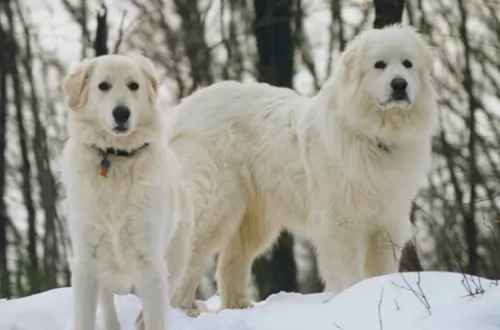 ◆The thick white hair will require regular grooming to keep it free from burrs and dirt. He sheds so this brushing will help him to look more groomed.
◆The thick white hair will require regular grooming to keep it free from burrs and dirt. He sheds so this brushing will help him to look more groomed.
◆The nails should be trimmed regularly and the ears too should be checked for redness and infection. You’ll need to look inside his mouth too as a rotting tooth can cause havoc within his body. A rotten tooth can also cause him tremendous pain and he has no way of telling you this.
◆Have your pet spayed or neutered if you don’t want any puppies. This is better for your dog’s health in the long run too.
◆Your Slovak Cuvac is going to need a lot of exercise as they have always been used to roaming the mountains watching over livestock.
◆This is a big dog so if you buy commercially manufactured food, make sure its for large, energetic dogs. There are good commercially manufactured dog foods on the market – just make sure you buy the best one for your pet to enhance health and longevity.
Try and give him some home made food too. Healthy food which won’t jeopardise his digestion is boiled chicken, brown rice or pasta and spinach, sweet potatoes and carrots. These can all be chopped up and small portions mixed into the dry kibble twice a week as a treat.
Try and include some raw meat occasionally. Your dog will thank you for not giving him exotic people foods which can do lots of harm. Ensure there is always a bowl of fresh, cool water within his reach.